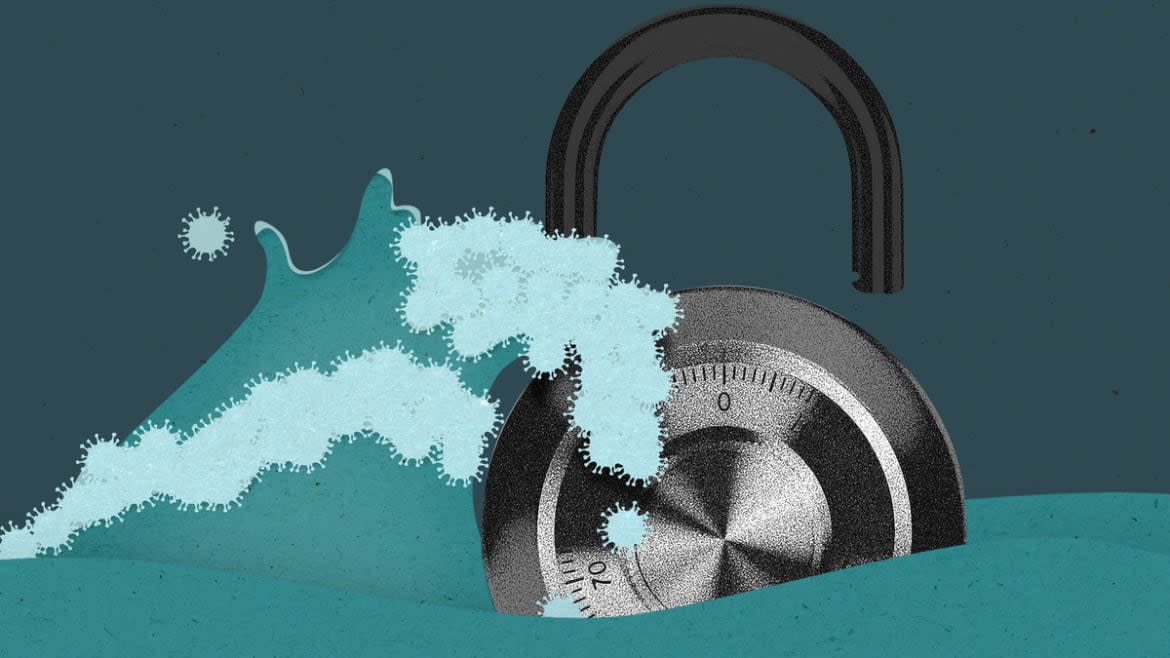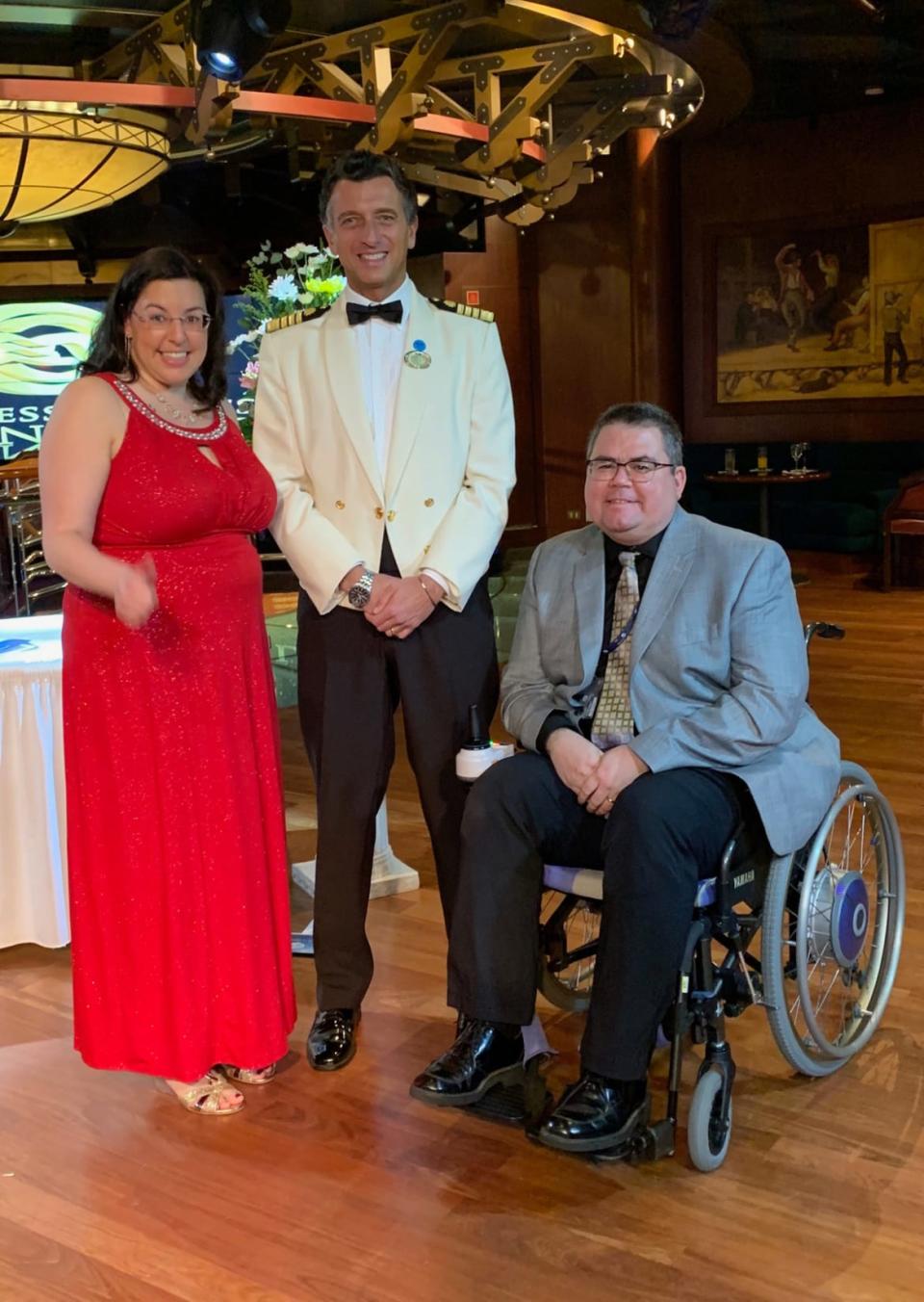COVID-19 Cruise Ship Survivors: Ending Lockdown Is ‘Crazy’

Chances are, Kent Frasure has been on lockdown longer than you have.
On Feb. 18, nearly one month after boarding the now-notorious Diamond Princess ship in Japan for a 15-day cruise, 42-year-old Frasure sat at a desk littered with drained cups of noodles and tattered copies of the company’s television guide. He gripped a pad of stationery imprinted with the slogan “Come Back New.”
He was composing a statement that would enable the U.S. State Department to share information about his situation with family members, friends, and individual members of Congress. As he wrote, his 36-year-old wife Rebecca was isolated in a Tokyo hospital bed recovering from the novel coronavirus.
A full 28 days after testing positive on Feb. 5—and weeks after her symptoms subsided—Rebecca finally tested negative for the virus and was discharged from the hospital, she told The Daily Beast. Three subsequent negative results later—after five days of follow-up medical screenings, and a whole host of similar hurdles for Kent, who never tested positive—the couple flew home to Forest Grove, Oregon, on March 10.
“We really had it in our minds that we were going to come back home and everything was going to be OK,” Rebecca said this week.
Obviously, everything was not OK. The United States was just beginning to grapple with the scale of its own COVID-19 epidemic, one that has since sent most of the country into virtual lockdown and killed over 45,000 people. But even after months spent alone in hospital rooms, on the ship, and in their home—an interregnum Kent described as “never-ending”—the couple think it’s “crazy” for states like Georgia to begin lifting stay-at-home measures.

Kent and Rebecca Frasure were on the ill-fated Diamond Princess cruise.
“Going to a restaurant or getting your nails done is not worth somebody's life,” Kent Frasure told The Daily Beast, acknowledging that the waves of depression and frustration he’s had from the stress and isolation closely mimic the stages of grieving. He would “really, really” like to go back to movie theaters and restaurants as soon as he’s able to safely, he added.
Just days after unpacking from the harrowing coronavirus outbreak on the cruise—at one point the largest outside of China, infecting 712 people and killing nine—the Frasures got the latest deflating news: Gov. Kate Brown issued a stay-at-home order for Oregon.
“It was really weird to come back and then basically be in a quarantine and isolation all over again,” said Rebecca, who works in customer service for a health insurance company.
Both Rebecca and Kent have been careful to try not to let their personal frustration warp their perspective, as they both have jobs and recognize how many others are in dire straits across the country.
“If I knew anything about medicine I would love to go help and do something,” Kent said. “I just really feel for those folks that are putting their life on the line.”
Over 22 million Americans have lost their jobs, and anti-lockdown protests are often framed as essential to salvaging livelihoods and even lives. But the couple has seen how much damage this thing can cause up close.
“This is far from over, and I think we’re jumping the gun,” Rebecca said. “The economy will come back, but people don’t.”
“There are so many people in that high-risk category who still need to go grocery shopping and are terrified to leave their homes because other people don’t take it seriously,” she continued. “You may not feel sick but if you’re infected, go to a grocery store, and touch five things you don’t buy, you could be responsible for a person’s death.”
What’s frustrating, Rebecca added, is that the federal government should have known months ago that they were going to have to mass-test Americans for the virus, but failed to take the right measures to prepare. Without enough tests, she said she worries that more outbreaks will follow prematurely ended lockdowns.
“People can be asymptomatic for so long. It’s a huge risk,” Rebecca explained, pointing to the weeks she said she tested positive for COVID-19 after her symptoms subsided. In a subsequent study of the ship’s passengers, researchers found that 18 percent of those who tested positive for the virus on board the Diamond Princess remained symptom-free throughout their infection, echoing a larger body of evidence about so-called “silent spreaders.”
“The more testing they did, the more cases they found,” said Kent. “How were we not preparing and getting tests ready when we saw in China—and even the cruise ship—it was the only way to know about all the infections?”
As has been widely reported, the troubled rollout of effective diagnostic kits in the U.S. has plagued the nation’s response to the virus and left many public health authorities blind to how—and where—infections were spreading around the country until hospitals were already flooded with patients. On Wednesday, health officials in California pushed back the original timeline of the first COVID-19 death in the United States to Feb. 6, after autopsies were conducted on people who died at home and hadn’t been tested.
Public health experts tend to agree with the Frasures’ seasoned take on the necessity of long-term social-distancing measures.
“As the number of people at risk for new infections decreases, so too does the chance for ongoing or increased COVID-19 transmission once the shelter-in-place orders are relaxed,” said Dr. Timothy Brewer, a professor of epidemiology and medicine at UCLA who has served as an adviser for the World Health Organization, CDC, and National Institutes of Health. Until testing capacity is improved, he argued, maintaining shelter-in-place orders is important to prevent transmission within a given community, some of which are “struggling to meet the healthcare needs of COVID patients with severe or critical disease.”
California native Kimberly Vincent, a 73-year-old who was stuck on the same harrowing cruise as the Frasures before returning to her home in Australia, where self-isolation was already being requested by the government, called the U.S. response “a joke” and “disgrace.” She said she was incensed by states considering ending stay-at-home orders.
“Self isolation should be the way to go for the foreseeable future—whether we like it or not,” Vincent wrote in an email from her home in New South Wales, which she shares with her 77-year-old husband Ellis. Together, the couple has been in some version of lockdown since Feb. 3. That’s about 80 days.
Dr. David Larsen, an associate professor in the Department of Public Health at Syracuse University who specializes in global health and infectious diseases agreed that, at least for now, the risk of moving too early was everything. “There is great benefit to living in a state with a concrete plan and system to diagnose every case, trace and test every contact, and isolate every infection,” he said.
Without knowing those plans are in place, said Larsen, “I would not feel comfortable easing off social distancing. Otherwise, it’s kind of a black box situation where we can’t see the virus in real time, we can only see the delayed hospitalizations and deaths two weeks after there’s been spread.”
Though Kimberly Vincent—who is in remission from skin cancer—said she deeply understands the necessity of such measures, it hasn’t been easy.
‘Mortified and Appalled’: Atlanta Rages as Governor Eases Lockdown
“We feel we were at the coalface of this virus,” she said. Her husband Ellis added that the experience of watching the rest of the world succumb to the pandemic after it ravaged the cruise ship has been “truly frightening.”
“Neither of us sleep well,” said Kimberly, who added that the couple’s “one joy” was spending 24 hours per day with their cats while trying to avoid lethargy by binge-watching Netflix, cooking, and reading. “At times it’s just a chore to reply to well-intentioned emails.”
But she has no illusions about things changing any time soon, and couldn’t help looking back with frustration—and even derision—at fellow Americans insistent on packing it in early.
“This is the new norm,” she said.
Got a tip? Send it to The Daily Beast here
Get our top stories in your inbox every day. Sign up now!
Daily Beast Membership: Beast Inside goes deeper on the stories that matter to you. Learn more.

 Yahoo News
Yahoo News 
